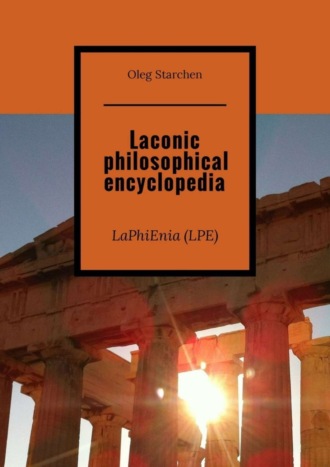
Полная версия
Laconic philosophical encyclopedia. LaPhiEnia (LPE)

Laconic philosophical encyclopedia
LaPhiEnia (LPE)
Oleg Starchen
© Oleg Starchen, 2018
ISBN 978-5-4493-2410-8
Created with Ridero smart publishing system
(I am not very well know English, so, I apologies for mistakes.) This encyclopedia is about the love of wisdom, and it is laconic, which is defined by its name. This “encyclopedia” is such not in the academic sense, but in the Hegel sense, because the great philosopher Georg Hegel created the original work “Encyclopedia of philosophical Sciences”. Therefore, a LAconic PHIlosophical ENcyclopedIA, or, for short, i.e., speaking laconically, LaPhiEnia (LPE) is also the ORiginal PHIlosophical ENcyclopedIA, OrPhiEnia.
© Oleg Starchen, 2018
First publishing in Ridero: 07.03.2018 © Oleg Starchen Translators: Yandex.Translator and Oleg Starchen
DEDICATED
to my historical friend,
to congenial but different,
to wise but mad,
to silent but evil,
to proolegoman’s philosopher,
to superman’s thinker,
as he himself said and considered himself, to “pole”
Wilhelm Nietzsche
and also to my big sister named Irene.
PROLOGUE
This encyclopedia is about the love of wisdom, and it is laconic, which is defined by its name. This “encyclopedia” is such not in the academic sense, but in the Hegel sense, because the great philosopher Georg Hegel created the original work “Encyclopedia of philosophical sciences”. Therefore, a LAconic PHIlosophical ENcyclopedIA, or, for short, i.e., speaking laconically, LaPhiEnia is also the Original philosophical encyclopedia, OrPhiEnia. This encyclopedia is called as encyclopedia in the literal and obsolete, i.e. in historical terms, in ancient Greek, this word means “learning in a full sphere”, i.e., as far as possible within the framework of laconicism, the full sphere of learning. This is the third edition of the LPE, in contrast to the first edition of 2012 (on Proza.ru) and from the second edition on June 5, 2018 (on Ridero). This revised and supplemented, corrected and better edition, but quantity remains by definition the same – 300 laconic i.e. sore and gained ideas. Laconic encyclopedia means dictionary, because the verbose dictionary means encyclopedia. And it’s not a simple philosophical dictionary, but the first orgaosophical and zeazrosophical dictionary. The articles in this dictionary or this encyclopedia represent aphorisms, laconisms, i.e. a concise definition of neologisms and neodilogisms (i.e., the dual neologisms, new combinations of two words). Diligence of the author was in the possible greater originality of the themes (because on the website of the Proza.ru, where it was first published this book in 2012, is the symbol © as a formal attribute of each production), so LPE is almost useless for those wishing to study the history of philosophy (although in LPE are articles that show original retrospective on the history of philosophy), but LPE is very useful, i.e. cognitive, to explore the latest trends and the future of philosophy, philosophy of the XXI century ad. Topics of LPE, in most cases, are neothemes, checked for originality to the most important Internet search engines. The explanation of these neothemes is based on the philosophy of supermind, i.e. Zeazrosophy, in that the core rod and the trend of LPE. In the first edition, articles of LPE were not arranged in a systematic manner, which was defined by the Hegelian and historical meaning of the encyclopedia, as well as its originality, its style – the stream of consciousness, the free arrangement of thoughts, as they could be invented and published, but in this edition the vocables are arranged in alphabetical order, which is more consistent with the genre of the encyclopedia or dictionary. LPE is the most concise manifestation of philosophy of Starchen as a philosophical movement. More verbose about topics of Laphienia, by the author’s point of view, is in my manuscripts, but to publish this would be too long, difficult and uninteresting. The number of articles in the LPE is several hundred, but according to laconicism to read this encyclopedia can be fast and interesting.
This is edition 3.1, because this edition is translated on the English language. In this regard I express my thanksgivings to sites translate.yandex.ru and translate.google.com.
Edition 3.2 must be on Ridero etc.
This is edition 3 because i have added illustrations and some text betterments to this edition. In this regard, i express my thanksgivings to the site Pixabay.com (for beautiful illustrations) and sites Litres Samizdat.
Neothreelogism Laconic philosophical encyclopedia first published 20 December 2011 © Oleg Starchen.
The first edition of the LPE published:
November 15, 2012 © Oleg Starchen. (edition 1.0, text)
Second edition of the LPE published:
5 June 2018 © Oleg Starchen. (edition 2.0, text)
Third edition of the LPE published:
3 July 2018 © Oleg Starchen. (edition 3.0, text), with illustrations.
Translation of Third edition of the LPE published on Stihi.ru:
1 august 2018 © Oleg Starchen (edition 3.1, text)
Translation of Third edition of the LPE published on Ridero.ru:
2 august 2018 © Oleg Starchen (edition 3.2, text), with illustrations.
Author of the Laphienia understands that the first, second and even third edition of this book devoted to such a complex and multifaceted science, as philosophy, can not be free from shortcomings and mistakes. All comments and suggestions, as on the system of the Laphienia, and on the content of individual articles, as well as indications of possible inaccuracies would be accepted with thanksgivings.
Socratic reductions, some of which are specific only to Laphienia:
ad – our era, ath. – philosophical era,
see – see or see with respect,
i.e. – that is,
old-gr. – see vocable old-gr. philosophical terminology,
lat. – Latin or Latvian,
etc. – and so forth.
Vocables are arranged in alphabetical order without taking into vocables “THE” article, but if vocable is very important, then the article “THE” is in vocable, thus the most important from my point of view vocables are in the chapter “T” of encyclopedia, the rest vocables consists article “the” of the lower case letters.
300 LACONISMS
A
1 the AUTOBIOGRAPHICAL PHILOSOPHY
Philosophers often philosophized based on their biography. For example, Nietzsche (or Nieche) even wrote a whole philosophical autobiography “Ecce homo. How they become themselves.”
2 the AMBER OF PHILOSOPHY
The illustration of the philosophical amber – the real amber. Indeed, it looks like a philosopher’s stone.
Laconic aphorisms is amber of philosophy (etymology of the term amber or the “yantar” – dziñtars, by lat.), philosophy, like the psychological resin of the brain, which heals it from psychological trauma, from mental suffering and from silliness, flows from the soul in philosophy, in writing of literature about the love of wisdom, freezes, petrifies and is immortalized in laconisms. Therefore, the philosophical amber – it is the most notorious “philosopher’s stone”.
3 the ACOUSTICS OF PHILOSOPHY
True philosophy is so loud that its roar has been spreading across the planet for millennia. Phonics philosophy is powerful. And even if this includes the proverb “empty barrel sounds louder”, it is not a simple barrel, but the famous barrel of the great cynic Diogenes.
4 the ALIEN PHILOSOPHY
Even Kant in the “Critique of pure reason” argued that alien beings will have other a priori forms of knowledge than a human. This means that they will necessarily have the functions of the super-consciousness, and their own special, alien philosophy.
5 the ALL POSSIBLE PHILOSOPHY
Zeazrosophy and Orgaosophy is all possible philosophy, because it represents all possible to understanding philosophy.
Note. This includes two proverbs:
α. “Who has what hurts, that’s what he says.”
β. “Everyone understands everything by his spiritual purity, or by his spiritual dirtyty”.
6 the ALL-WORLD-HISTORICAL PHILOSOPHY
The philosophy of the planetary scale is a synonym of the all-world-historical philosophy.
See Philosophy of planetary scale.
7 the ANOMALOUS PHILOSOPHY
Zeazrosophy (Zelastrosophy, i.e. Philosophy about supermind) is anomalous for the beginning of the XXI century ad and supernomalous to the end of the XXI century ad
8 the APOTHEOSISOPHY
Apotheosisophy is a synonym of Zelastrosophy, because it is a true apotheosis of philosophy. Nietzsche thought that, allegedly, quote, “God is dead”, but according to apotheosisophy, “God is mad”, i.e. figuratively God is frantic, delirious in present time, God is not as real GOD in present time, but will be that in the future. Of course, these characteristics of God is only philosophical images, philosophical metaphors.
9 the ARCHAIZATION OF PHILOSOPHY
In the twenty-first century is necessary to archaization of the philosophy to the old-gr. level to elevate it to OLD-Gr. level. Modernization of philosophy is dialectical, for upgrade is need archaization. So, now not only of the XXI century A. D. but XXVII century A. Thales too.
10 the ARCHAIC PHILOSOPHY

Philosophy is connected with such art as architecture. This is one of the ideas of archaic philosophy.
Archiepistemology, Archiontology, Archiaesthetics etc. are Archaic and therefore old-gr. philosophies.
11 the ARCHIAXIOLOGY
The etymology of the term: αρχι – main, axiology – the science of values. Conventional axiology – the ordinary philosophy. But Archiaxiology is axiology of Non-Thalesic philosophy, of General theory of supramentality. From the point of view of this philosophy, the main exactly EPISTEMOLOGICAL value is the supramental knowledge obtained as a result of superconsciousness.
12 the ARCHIONTOLOGY
ArchIontology (αρχι-main, ontology-the science of objects, according to old-gr.) the ontology of Non-Platonic philosophy that studies the objective supramentality. (subjective studies Archiepistemology). Archiontology dichotomously divided into Superontology – ontology learning of particularly supramental, attain the pure overmind, and Zeazroontology, studying of General Supramentality, attain an infinite continuum of cognition functions.
13 the ARCHIPRAGMATISM
“Truth is defined as usefulness” (Dewey). So Archiepistemology is the great Truth, because the usefulness of its results for humankind will be great. Pragmatism is “the philosophy of the success of human action”, pragmatism is one of the sources of Zelastrosophy, so naturally, Zelastrosophy is the Philosophy of mankind’s success.
14 the ARCHISOPHY
Philosophy is related to such types of art as sculpture and architecture. This is one of the ideas of Arhisophy.
Archisophy means main wisdom, so the term is more powerful than the term Archiphilosophy, which means the main, but only the love of wisdom.
15 the ATTENTIVE PHILOSOPHY
Zelastrosophy brings to the supermind more philosophical attention than other philosophy.
Note. First published: 2012 ©.
16 the ATHLETICS OF PHILOSOPHY
Non-platonic philosophy, Zelastrosophy is athletics of philosophy, making it a powerful. Because “knowledge is power” (Francis Bacon), and supramental knowledge will be superpower (Oleg Starchen). And “if the greater the power, then the greater the responsibility” (Peter Parker). It is therefore necessary not just zeazrovning of mind, but zeazrovning of moral too.
17 the ATOMIA OF PHILOSOPHY
Atomia (undivided, in old-gr.) of philosophy is syncretism, the poor state of philosophy before Non-thalesic philosophy.
18 the AUGMENTATION OF PHILOSOPHY
The augmentation of philosophy is achievable by overcoming it, becoming a conventional philosophy in non-Pythagorean philosophy, which will make it more powerful.
B
19 the BINOMIAL OF PHILOSOPHY
(bi – two, lat., νομ – part, according to old-gr.)
This divide of philosophy into two parts – ordinary (thalesic) and extraordinary (Non-thalesic). Similar in name to Newton’s binomial.
20 the BRIGHTING PASSION FOR WISDOM

The Northern lights-a figurative illustration of a bright passion for wisdom.
Fiery passion for “Sophy”. In old-gr. this philosophical expression sounds: Orgaosophy. The General theory of Supramentality not just love, but brighting passion for wisdom, by showing her a supramental infinity, so Zeazrosophy on the philosophical fact is the Orgaosophy. Note. Orgaosophy published for the first time in 2012 A.D. The expression of “philosophy” was expressed by Pythagoras around the VI century BC.
C
21 the CALLIGRAPHY OF PHILOSOPHY
The philosophy of woman, the Philogyneya, is in some sense a calligraphic philosophy, because it produces a description of beauty, which is immanent, is inherent to a woman. Note. As in the book “the Head of Professor Dowel” fantasist Belyaev said to laboratory’s assistant: “you are a woman, and also beautiful, so a woman twice” i.e. WOMAN.
22 the CENOZOIC PHILOSOPHY
The etymology of the term: ceno i.e. καινος – new, zoic i.e. ζοε – life (old-gr.). The philosophy of the new life, Non-Thalesic philosophy, General theory of Supramentality, because of achieving the supermind will begin a new life of mankind, so this mankind become to mindkind with superconsciousness, i.e. with superconscience of zeazrovning Mindkind means mankind with good and gentle mind, i.e. with beautiful mind.
Note. First published in 2012. New life of mankind will be much better and much pleasure, so Cenozoic philosophy is also “Kaifnozoic philosophy” (metagram and comical, humorosophical term).
23 the COMPLAINT PHILOSOPHY
α. According to philosophical philology, the word “complaint” is one of the possible epithets of philosophy (see Epithets of philosophy). As a real example of such ideal philosophy or perfect philosophy – Nietzsche’s quote: “…you understand why I publish this book beforehand: she must NOT allow even the slightest violence against me…” (“HERE’s a MAN! How they become themselves”). Or so said one wonderful girl from the well-known and all-beloved Oscar-awarded film on the city, tears and belief: “if anyone, even with a finger…”
β. The author of the work “Complaint book” is well-known and all-loved Anton Pavlovich Chekhov. Complaint philosophy is a philosophical remake of this work by Chekhov.
24 the CIVILIZATION OF SUPERTHINKERS
It is the civilization of Superhuman based on the Overmind. Knowledge will be enhanced by becoming to superconsciousness; evil will be deactivated; Superhumanity will be able to become the main civilization in the Universe.
25 the CINEMATIC PHILOSOPHY
It is a philosophy that has been influenced by cinema (for example, a remake of philosophy, a philosophical thriller, a philosophical drama, a philosophical comedy, a philosophical tragicomedy, the directing of philosophy, a philosophical director, a philosophical sequel, a philosophical prequel, a philosophical role, a philosophical cameo, etc.).
26 the COMICAL PHILOSOPHY
(exactly comical philosophy, do not confuse with coSmical philosophy)
Such a philosophy is impossible to read or listen to, without laughing at the same time at least sometimes. For example, humorist in philosophy was Nietzsche, and Levin.
Note. That is exactly LeVin (psychologist). In the first edition of the LPE was a misprint.
27 the COURAGE OF PHILOSOPHY
As my colleague, Aristocles Plato, said, “philosophy should not be mediocre, but brave, even shameless.” For example, Philogyneya quite adequate for such teachings of the ancient Greek philosopher. Such courage and shamelessness helps to the progress of philosophy. Note. Quote one Laconian: “I’m not afraid of anything, but that’s what I’m afraid, is that I’m not afraid of anything. But I’m not afraid of anything, so I’m not afraid of that too.”
28 the CHRONOAGNOSTICISM
A clock is not a time machine, but a machine that show’s time, i.e. a clock is an epistemological time machine.
The view that it is impossible to know the future, this chronoagnosticism, futuroagnosticism. Prophetic philosophy overcomes this epistemological pessimism, this epistemological stereotype of philosophy.
D
29 the DRIVING PHILOSOPHY
Orgaosophy in fact is the driving philosophy behind leading the entire philosophy of the XXI century to the XXII century, and even more to the XXVII century, because the XXI century ad (Anno Domini) according to Orgaosophy is the XXVII century ath. (Anno Thales), philosophical era, starting with Thales.
30 the DICHOTOMY OF THE PHILOSOPHY OF ILLUMINATION

The sun shines brightly on everything, but in some places there are shadows.
Nietzsche thought Heraclitus is unique in its sense. Indeed, it is possible to divide dichotomously philosophy not on materialism and idealism, but on the “dark” philosophy (Heraclitus, etc.) and eudiosophy, i.e. clearly understanding philosophy (almost all other philosophers).
31 the DELICACY OF THE PHILOSOPHY
The quality that inherent in the original philosophy is its delicacy, for such a philosophy raises unusual topics and points of view of the philosophical consideration of reality, which may at first glance look as scandalous and shocking.
32 the DEMIURGE OF THE OVERMIND
Natural science’s scientist who will make the final step to creation of supermind, is the demiurge of the overmind in science.
33 the DESPERATE PHILOSOPHY
It’s the philosophy of a desperate man trying to save himself and his sister, who’s disabled.
E
34 the EUROPEIZATION OF SUPRAMENTALISM
Sri Aurobindo Ghosh joined Hegelianism and Indian philosophy and received as a result supramentalism, Europeization of which made Zeazrosophy.
35 the EUROPEIZATION OF PHILOSOPHY
Thales of Miletus and other ancient Greek philosophers carried out the Europeization of philosophy, so that philosophy did not remain the privilege of the East, India and China.
36 the EVIL IS ATAVISM
Gorilla is not so evil as chimpanzee and human. This is because the gorilla is less related to humans than the chimpanzee.
Evil is an atavism, inherited from his evolutionary ancestors, which were not yet social. Therefore, human tries to fight evil, because he lives in a society where evil is not only no longer useful, but also became harmful.
Note. See the book Categorics.
37 the EXTRAUNIVERSAL PHILOSOPHY
It is difficult even to imagine on such philosophy. The General theory of supramentality shows that in other Universes will be the superconsciousness abilities, adequate to these Universes.
38 the EUCONFABULATORICS
According to the hygiene and euconfabulatorics, to clear the memory from unnecessary and harmful memories is important just as washing hands.
Diogenes Laertius in his famous book writes that Antisthenes, the founder of cynicism, believed that it was “science to forget unnecessary – the most necessary science”. In this regard, it is interesting to philosophize about such a possible philosophical science. Such a science can be called as Euconfabulatorics. Etymology of the term: “ευ” means good (according to old-gr.), “confabulation” (in lat.) means the imaginary memory. Elementary hygiene agrees with Euconfabulatorics, this the most necessary science of Antisthenes.
39 the EMBLEM OF PHILOSOPHY
Let the emblem of a philosophy is the heart and spectacles. The heart symbolizes love, and the spectacles symbolize wisdom, not just a lack of vision.
Review. “On the spectacles… are you sure?”
(Gregory Fox Galaktion, 01.25.2012)
Note. α. This work was first published in 2012. Only later the author learned that the symbol of polyamory (i.e., the theory of love not to a single woman, but to many women at once and at the same time absolutely sincere love) is surprisingly similar to the proposed emblem of philosophy, namely: the emblem of polyamory – the symbol of the heart, on which is the symbol of infinity. Thus, the emblem of philosophy is the emblem of Philogyneya as polyamory.
β. Here’s what about the philosophy’s emblem was published after my publication in 2012: https://otvet.mail.ru/question/89935161
40 the EPITHETS OF PHILOSOPHY

One of the possible epithets of philosophy – is a sunny philosophy.
(Do not confused with “Epictets of philosophy”, i.e., of the stoic philosophers, variously congenial claiming that happiness is subjective, and not objective, a nominal name from the ancient Roman philosopher Epictetus)
Philosophy deserves many epithets. Therefore, they are multitude in quantity and multitude in quality. For example, concise or laconic philosophy (Laphienia), categorical (Categorics), supramental (Zeazrosophy), imaginary (Orgaosophy), philogynic philosophy (Philogyneya), etc.
41 the ERGAOSOPHY
Óργ or Εργ by old-gr. means “work.” The meaning of Ergaosophy: this is a working philosophy, in contrast to philosophy an idle, in contrast to lazy philosophy.
42 the ESCALATOR OF PHILOSOPHY
Unlike Wittgenstein’s “Logical-philosophical treatise” as a ladder, Zeazrosophy – escalator of philosophy and knowing, self-propelled to the height, to reach the top of philosophy and knowledge.
43 the ETHICS OF IMAGINATION’S IMAGINATION
Such ethics is based on the principle: “imagine the imagination of a person in relation to you, with whom you act, and act so that this person has no reason for the desire to imagine a bad act, word or deed, in relation to you.” Imagination of imagination is empathy. It’s something like of overmibd by Kordemsky, that he meant, however not using this term in the book “Mathematic savvy” in the task of the “Three wise men”, in which the sages laughed.
44 the ETHICS OF TWINGE OF CONSCIENCE
Ethics of twinge of conscience is Zeazrosophy i.e. philosophy about the True over-thinking (zeazrovning). Ethical term the twinge of conscience [literally “zazrenie”] and the epistemological term the zeazrovning [literally “zeazrenie”] differ only in one letter, the letter E. There is a close metaphysical connection between them. One zeazrovning not enough for the good of mankind, it is necessary also twinge of conscience as genetically innate and inborn function of the psyche of future Superthinkers, coupled to zeazrovning. Otherwise, over-thinking and zeazrovning will be not for good but for evil, not for benefit but for harm.
45 the ETIOLOGY OF EVIL
Human evil is a painful psychological atavism inherited to mankind because of pathological genetic inheritance from ape-like ancestors. This idea was first invented by William Gerald Golding, an authoritative writer. Knowledge of etiology, i.e. the origin of any pathology, helps its diagnosis, prevention, and healing.

